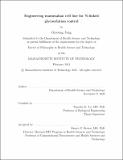Engineering mammalian cell line for N-linked glycosylation control
Author(s)
Jung, Giyoung.
Download1251803194-MIT.pdf (8.701Mb)
Other Contributors
Harvard--MIT Program in Health Sciences and Technology.
Advisor
Timothy K. Lu.
Terms of use
Metadata
Show full item recordAbstract
N-linked glycosylation in monoclonal antibodies (mAbs) plays a critical role in their biological function, clinical efficacy, and safety. mAbs have highly conserved N-linked glycans at the Asn297 position of the Fc region affecting Fc-mediated effector functions, including antibody-dependent cellular cytotoxicity (ADCC) and complement-dependent cytotoxicity (CDC). Despites increasing efforts to develop strategies for glycoengineering, the lack of tools to precisely control mAb N-glycosylation has significantly hampered the production of more effective and safe antibodies. Here, we leverage synthetic biology to control mAbs fucosylation and galactosylation with small molecule inducible systems and synthetic miRNA regulators in engineered Chinese hamster ovary (CHO) cells. We achieved precise tuning of fucosylation (0-97%) and galactosylation (0-87%) levels with dose-dependent induction of two glycosyltransferases genes, FUT8 and [beta]4GALT1. Importantly, orthogonal and small molecule inducible gene expression enabled us to simultaneously and independently control levels of fucosylation and galactosylation. Next, we developed a system for intrinsic control of mAbs fucosylation, thereby eliminating the need for expensive small molecules. Using FUT8⁻/⁻ CHO cells, recombinant FUT8 expression levels were controlled by varying numbers of synthetic miRNA target sites at the 5' and 3' UTRs. Upon induction of miR-FF4, precise tuning of mAb fucosylation levels (0.9-98%) were achieved and mAb production remained stable for long-term experiments. The development of tools to control N-glycosylation levels of monoclonal antibodies will help to overcome existing bottlenecks in next-generation antibody engineering, thereby improving their clinical efficacy.
Description
Thesis: Ph. D., Harvard-MIT Program in Health Sciences and Technology, February, 2021 Cataloged from the official PDF version of thesis. Includes bibliographical references (pages 101-109).
Date issued
2021Department
Harvard University--MIT Division of Health Sciences and TechnologyPublisher
Massachusetts Institute of Technology
Keywords
Harvard--MIT Program in Health Sciences and Technology.